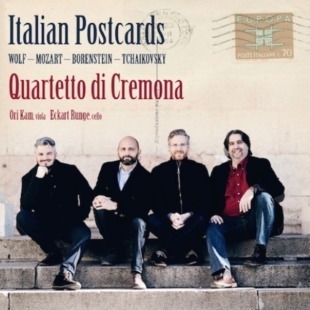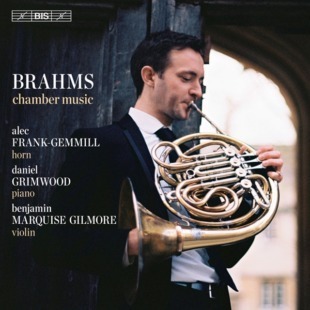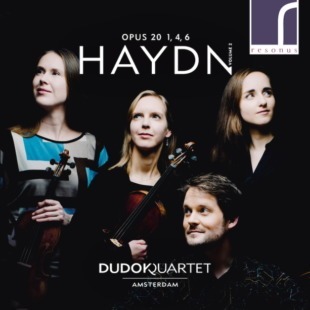
Italian Postcards
Wolf, Mozart, Nimrod Borenstein & Tchaikovsky (Avie)
The soaring tessitura of the initial impulse [Cieli d’Italia], sweetly harmonized and accompanied by plucked strings, evokes the clarity of Italian skies. The playful aspects turn to a more melancholy affect, agitated and featuring some impassioned riffs from the viola (Simone Gramaglia). The strong rhythmic shifts suggest a largesse in a rather compact piece, lasting seven minutes but packed with lyrically attractive and learned effects in a tonal style that maintain our attention… This entire disc comes highly recommended.
Gary Lemco, Audiophile Audition, 14 March 2021
Nimrod Borenstein’s coruscating Cieli d’Italia and Tchaikovsky’s intense Souvenir de Florence head up an absorbing programme. The quartet perform with terrific elan.
Oliver Condy, BBC Music Magazine, March 2021
Supported by violist Ori Kam and cellist Eckart Runge, the Quartetto di Cremona ignites a rousing passion and energy. Be it in the opening Allegro, which sometimes seems like it is being played under high voltage and sounds a bit rougher and wilder than in other recordings, be it in the orchestral abundance of the Allegretto, or in the Adagio, in which the six strings unite in a ravishing indulgence. Smooth and full of vibrato in tone, but still far removed from any kitsch that you can otherwise experience on postcards.
Marcus Stäbler, Fono Forum, 3 February 2021
The Quartetto’s close-set sound and intense engagement emphasise vibrant Russian colours over the neo-Classical elegance of Tchaikovsky’s sextet… the Cremonese and their friends bring Florence to life in the here and now.
Peter Quantrill, The Strad, January 2021
…this quartet plays different instruments, which gives it its incomparably warm sound: pure gold for Tchaikovsky’s Souvenir de Florence string sextet. The work by Nimrod Borenstein with the title Cieli d’Italia, which he wrote for the ensemble in 2019, is very luxurious and tonal, in the style of late romanticism – not far from Tchaikovsky. It depicts impressions of nature and celebrates the light of the south. Wonderful!
Matthias Roth, Klassic-CD, 17 December 2020
… overflowing with Mediterranean personality… their lissome ensemble is bracing and the carefree energy of their reading palpable.
Jonathan Blumhofer, The Arts Fuse, 2 December 2020
[That] excellent quartet, Quartetto di Cremona, has just released Italian Postcards (Avie): music by Wolf, Mozart, Borenstein and Tchaikovsky, played with zest and sparkle.
Fiona Maddocks, The Observer, 29 November 2020
An album for the ensemble’s 20th anniversary that offers the highest level of listening pleasure!
Corina Kolbe, Rondomagazin.de, 28 November 2020

Correspondances Debut recital CD on Rubicon Classics
…although I’ve mentioned his soft, dark poeticism, one of Ringstad’s aims has been to showcase his instrument’s potential as a virtuosic instrument. This is evident in Benjamin’s final Toccata and even more so in the album’s title track by Peder Barratt-Due, written for Ringstad in 2018. …the case Ringstad makes most fascinatingly of all with it is the viola’s capacity for upper register lyricism. Add superb partnering from pianist David Meier and it’s a strong recital debut. I’ve given you the Benjamin and the Vieuxtemps for this month’s playlist.
Charlotte Gardner, Only the Music’s Albums of the Month on dCS,
January 2021
[Hindemith’s Viola Sonata Fantasie] showcases Ringstad’s ripe, rhapsodic tone and the cleanness of his finger work in the outbursts of elaborate filigree. Charm and panache are in Ringstad’s armoury too … But the most interesting piece on the disc is probably Peder Barratt-Due’s Correspondances … A sharp-edged work that juxtaposes spiky, staccato rhythms with a keeningly lyrical centre section, it shatters preconceptions of the viola as a somewhat stuffy, conservative instrument, especially in Ringstad’s commandeering performance.
Performance: ****
Recording: *****
Terry Blain, BBC Music Magazine, February 2021
Ringstad waltzes his way around the floor with supreme nonchalance and agility, his 1768 ‘Vieuxtemps’ Guadagnini proving a mercurially responsive vehicle, from which he coaxes some hauntingly veiled sounds throughout the programme… The three movements that make up Benjamin’s Sonata are so many character pieces which Ringstad shapes most eloquently, moving seamlessly between soulful sadness, wistful remembrance and motoric, forward-surging energy… Hindemith’s Sonata brings this warmly recorded recital to an exhilarating conclusion, its wide-ranging variations emphatically characterised by both players.
Carlos Maria Solare, The Strad, January 2021
Viola Brilliance
Only rarely is a viola player prominent enough to shine as brightly as violin virtuosi. Eivind Ringstad is one of these… Correspondances shows why. Ringstad’s lyrical musicality and uniqueness as a viola player come to the fore… His approach is ambitious and well advanced. Ringstad has a lot to say and is not afraid to demand to be heard.
***** Maren Ørstavik, Aftenposten, 14 November 2020
Fauré, Schubert and Brahms on Rubicon
I felt that the restrained approach of the trio should work very well in the Fauré, and it certainly did. This is one of the best versions I have heard – elegant, atmospheric and very French – and if you love this work, his last, you certainly owe it to yourself to give this a listen.
David Barker, Music Web International, December 2020
The opening to Schubert’s Nocturne… is whisperingly exquisite, a remarkable synthesis between the strings, tender, beautifully shaped, before the more abrasively intense middle section… Brahms’ Piano Trio No 1… is all played with tender and impassioned commitment here.
***** Sarah Urwin-Jones, BBC Music Magazine, Christmas 2020
With Trio Isimsiz’s impressive 2017 debut recording still lodged pleasantly in the memory, this second album – made possible through a Borletti-Buitoni Trust fellowship – is a welcome sight. What’s more, it fully meets the high bar set by its predecessor, seamlessly picking up the latter’s threads of softly measured romance and taut poise … the 1889 revised version of Brahms’ Trio No 1 in B major is presented in a reading serving as a worthy successor to the debut album’s superb Trio No 3, pulling us in from the get-go to Brahms’ intense world of passionate emotion tempered by poised Classicism, confidence and joy tempered by fragility and doubt. It’s a reading to lose yourself in, whether in the ardent sweetness and power of their forte singing, or in the myriad different qualities of silence that they serve. We can only hope that a third album eventually arrives with Brahms No 2.
Charlotte Gardner, The Strad, December 2020

Brahms Chamber Music on BIS
There are so many fine recordings of Brahms’s Horn Trio, several of which I have in my library, that choice can be difficult. There is no doubt in my mind that this new one with Frank-Gemmill, Grimwood, and Gilmore is up there with the best. Indeed, it is now my version of choice for various reasons. Not least of all is the natural horn Frank-Gemmill employs with its lighter, mellower tone, but his technical skill is also transfixing.
The beauty of Frank-Gemmill’s tone is retained and the high run to the conclusion [of the Horn Trio] is exhilarating. This is the kind of rendition that makes one want to return to it immediately and hear it again. A magnificent performance!
Leslie Wright, Music Web International, November 2021
Fascinating to hear new colours in a familiar work, with Brahms’s First Cello Sonata transcribed for French horn. It also makes a fine prelude to a terrific performance of the Horn Trio. ****
Jeremy Pound, BBC Music Magazine, February 2021
…the sombre first theme [of Cello Sonata No 1, Op 38] translates into the horn’s autumnal tones like a dream … and Frank-Gemmill’s intelligent shaping and articulation all contribute to its success.
Charlotte Gardner, Gramophone, December 2020
This work [Horn Trio] is frequently played on the natural (unvalved) horn; using a vintage instrument with piston valves allows Frank-Gemmill’s quieter playing to really sing. This is a gloriously soulful performance with the Adagio mesto packing a huge emotional charge. The close is so desolate you wonder how Brahms will pick himself up. He does, of course, with another galumphing 6/8 rondo, Frank-Gemmill’s agility all the more impressive for being played on a vintage peashooter.
Graham Rickson, The Arts Desk, 14 November 2020
…a well balanced trio…with Frank-Gemmil’s lyrical phrasing and warm tone
Andrew MacGregor, BBC Radio 3 Record Review, 10 October 2020

Haydn Op 20 String Quartets Nos 1, 4 & 6 on Resonus Classics
The Dudoks, now recognised as one of the most stylish, open-minded and adventurous among younger ensembles, bring heady energy to all three quartets included here – Nos 1, 4 and 6
Fiona Maddocks, The Observer, 14 June 2020
This follow-up [to Vol 1] confirms the young Dutch ensemble’s Haydn credentials in performances that combine technical polish (immaculate timing, balance and ensemble), boundless vitality and a lively response to the specific character of each movement… I was exhilarated by the mingled virtuosity, finesse and coursing energy of these performances.
Richard Wigmore, Gramophone, June 2020
…the Dudok open the Allegro moderato of the E-flat Quartet sprightly [sic], bringing a transparency to the textures. I’ve found this performance particularly successful, communicative and commanding. The D major Quartet, even more than the previous performances of Op. 20, reveals an exceptional level of unity between the players, and the stylish playing makes them a pleasure to listen to. The minuet and trio have the occasional, stylish embellishment, creating an air of spontaneity. The Presto scherzando brings vivacity in this mostly serious reading. …Overall, the Dudok give performances that are essential listening for any chamber music or Haydn fan, with elements of both period sound and modern performance practice.
Leighton Jones, The Classic Review,11 May 2020